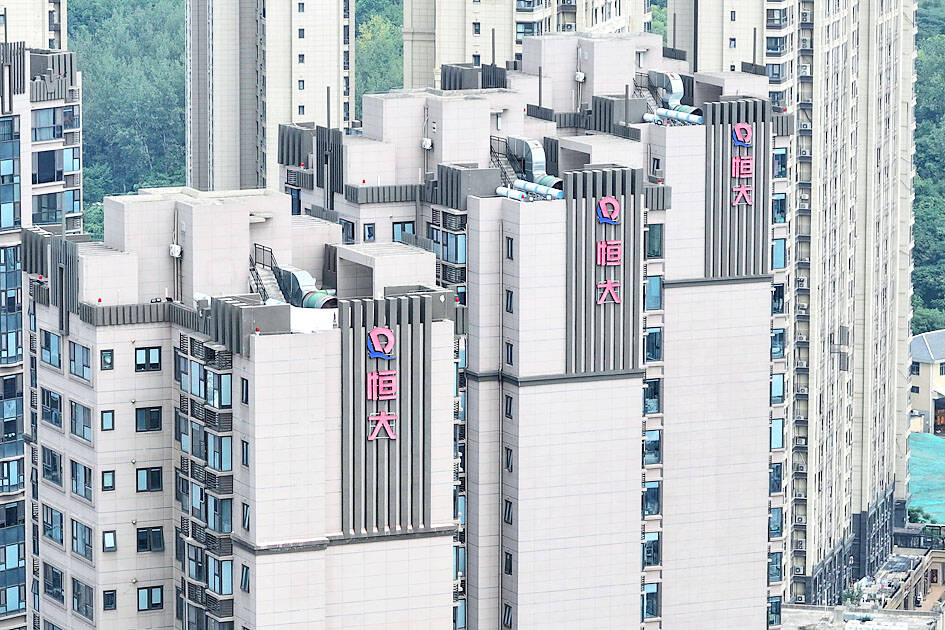Police in China have arrested several employees of a subsidiary of troubled Chinese property giant Evergrande Group (恆大集團), authorities said on Saturday.
Employees at Evergrande’s financial subsidiary, Evergrande Financial Wealth Management Co (恒大金融財富管理), were arrested, police in the southern city of Shenzhen said in a statement, without specifying the number of employees or the charges against them.
The statement called on the public to report any cases of suspected fraud to the authorities.

Photo: AFP
Evergrande’s enormous debt has contributed to the country’s deepening property market crisis, raising fears of a global spillover.
The property sector, which along with construction accounts for about a quarter of China’s GDP, is a key pillar of the country’s growth and has experienced a dazzling boom in recent decades.
However, the massive debt accrued by the industry’s biggest players — Evergrande had estimated debt of US$328 billion (307 billion euros) at the end of June — has been seen by Beijing in recent years as an unacceptable risk for China’s financial system and overall economic health.
Authorities have gradually tightened developers’ access to credit since 2020, and a wave of defaults has followed — notably that of Evergrande.
Another Chinese property giant, Country Garden Holdings Co (碧桂園), has narrowly avoided default in recent months, after reporting a record loss and debts of more than US$150 billion.
State-backed developer Sino-Ocean Group Holding Ltd (遠洋集團) on Friday announced it would suspend payments of offshore debts, the latest company to show signs of trouble.
Meanwhile, Moody’s rating agency on Thursday downgraded the outlook for China’s property sector from “stable” to “negative,” arguing that the government support measures will have only a short-term impact.

MULTIFACETED: A task force has analyzed possible scenarios and created responses to assist domestic industries in dealing with US tariffs, the economics minister said The Executive Yuan is tomorrow to announce countermeasures to US President Donald Trump’s planned reciprocal tariffs, although the details of the plan would not be made public until Monday next week, Minister of Economic Affairs J.W. Kuo (郭智輝) said yesterday. The Cabinet established an economic and trade task force in November last year to deal with US trade and tariff related issues, Kuo told reporters outside the legislature in Taipei. The task force has been analyzing and evaluating all kinds of scenarios to identify suitable responses and determine how best to assist domestic industries in managing the effects of Trump’s tariffs, he

TIGHT-LIPPED: UMC said it had no merger plans at the moment, after Nikkei Asia reported that the firm and GlobalFoundries were considering restarting merger talks United Microelectronics Corp (UMC, 聯電), the world’s No. 4 contract chipmaker, yesterday launched a new US$5 billion 12-inch chip factory in Singapore as part of its latest effort to diversify its manufacturing footprint amid growing geopolitical risks. The new factory, adjacent to UMC’s existing Singapore fab in the Pasir Res Wafer Fab Park, is scheduled to enter volume production next year, utilizing mature 22-nanometer and 28-nanometer process technologies, UMC said in a statement. The company plans to invest US$5 billion during the first phase of the new fab, which would have an installed capacity of 30,000 12-inch wafers per month, it said. The

Taiwan’s official purchasing managers’ index (PMI) last month rose 0.2 percentage points to 54.2, in a second consecutive month of expansion, thanks to front-loading demand intended to avoid potential US tariff hikes, the Chung-Hua Institution for Economic Research (CIER, 中華經濟研究院) said yesterday. While short-term demand appeared robust, uncertainties rose due to US President Donald Trump’s unpredictable trade policy, CIER president Lien Hsien-ming (連賢明) told a news conference in Taipei. Taiwan’s economy this year would be characterized by high-level fluctuations and the volatility would be wilder than most expect, Lien said Demand for electronics, particularly semiconductors, continues to benefit from US technology giants’ effort

‘SWASTICAR’: Tesla CEO Elon Musk’s close association with Donald Trump has prompted opponents to brand him a ‘Nazi’ and resulted in a dramatic drop in sales Demonstrators descended on Tesla Inc dealerships across the US, and in Europe and Canada on Saturday to protest company chief Elon Musk, who has amassed extraordinary power as a top adviser to US President Donald Trump. Waving signs with messages such as “Musk is stealing our money” and “Reclaim our country,” the protests largely took place peacefully following fiery episodes of vandalism on Tesla vehicles, dealerships and other facilities in recent weeks that US officials have denounced as terrorism. Hundreds rallied on Saturday outside the Tesla dealership in Manhattan. Some blasted Musk, the world’s richest man, while others demanded the shuttering of his